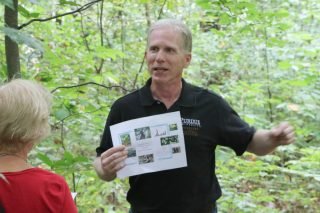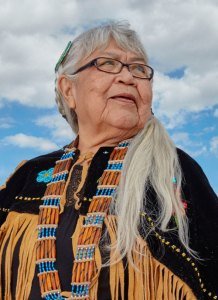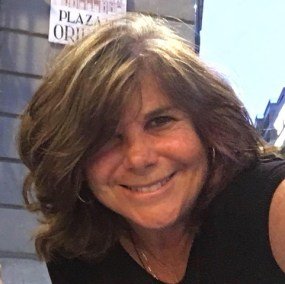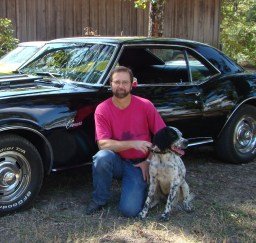2022 Joseph Grinnell Award — Dr. Rob Swihart

Each year the American Society of Mammalogists recognizes excellence in education with the Joseph Grinnell Award, which was established to honor individuals who have made outstanding and sustained contributions to education in mammalogy in the broadest sense. The 2022 recipient of the Joseph Grinnell Award, Dr. Rob Swihart, is a Professor of Wildlife Ecology in the Department of Forestry and Natural Resources at Purdue University, a position he has held since 1991. His research has focused on the ecology of forest-dwelling mammals, advancing fundamental ecological understanding and contributing to conservation and management of wildlife in human-dominated landscapes. Dr. Swihart’s efforts in mentoring are renowned in our field! He has mentored 32 graduate students, 60 undergraduate researchers, and 13 post docs, and many of his former students are leaders in mammalogy and active members of the American Society of Mammalogists. Dr. Swihart has received awards for outstanding teaching at both the undergraduate and graduate levels. His nomination was supported by letters from colleagues, former graduate students, and current undergraduate students, all of whom reflected on a caring mentor and a skilled and enthusiastic teacher of mammalogy and statistics, among other subjects. A consistent theme that emerged from the letters was Dr. Swihart’s willingness to take time to create respectful relationships that foster confidence, scientific excellence, and personal development. One undergraduate student wrote that “Every day, Dr. Swihart exhibits his passion for mammalogy.” Congratulations and thank you to Dr. Rob Swihart!
Conservation Presentation — Dr. Sarah James

Dr. Sarah James is Neets’aii Gwich’in from Vashraii Koo (Arctic Village, Alaska) located 170 km above the Arctic Circle in Interior Alaska. Originally nomadic within traditional Gwich’in boundaries, today Gwich’in live in 15 villages in northeast Alaska and northwest Canada. James was raised in a traditional Gwich’in way of life hunting, fishing, trapping and has traditional knowledge of air, water, land, life, and respect for the sun. Gwich’in remains her first language. James went away to Chemawa Indian High School in Oregon at age 13 and then attended college in San Francisco, where she joined the occupation of Alcatraz Island for American Indian rights. Later, James served on the Arctic Village Council and sat on the Native Village of Venetie Tribal Government, serving as the Environmental Representative for the US negotiating team for the International Porcupine Caribou Management Agreement. As Caribou People since time immemorial, in 1988 the Gwich’in Nation decided to protect caribou in response to Congressional proposals to drill for oil in the Coastal Plain of the Arctic National Wildlife Refuge. Sarah James was one of the spokespersons appointed by the Elders and served as founding board member and chair of the Gwich’in Steering Committee for many decades. The Elders recognized that oil development in the Porcupine Caribou’s calving and nursery grounds was a threat to the Gwich’in Human Rights and way of life and called for permanent protection for Izhik Gwats’an Gwandaii Goodlit − the Sacred Place Where Life Begins. The Gwich’in Nation has been successful against the most powerful corporations and government on earth to protect the spiritual connection of Gwich’in and caribou. Sarah James travelled constantly for nearly 30-years to educate the world about what is at stake for the Gwich’in in the campaign to protect the Arctic Refuge. In 2004, she completed the spiritual run Peace and Dignity Journey from Alaska to Panama and in 2005 she was in Washington DC for 5 months in spiritual vigil “Drum-Sing-Dance.” She has received many awards in recognition of her leadership including Alston Bannerman Fellowship award (1993); Ford Foundation “Leadership for a Changing World” (2001); Goldman Environmental Prize for “grassroots environmentalists” (2002); National Conservation Land Trust award (2002); Ecotrust’s Award for Indigenous Leadership (2004); Alaska Conservation Foundation’s Celia Hunter Award (2006); Alaska Women’s Hall of Fame (2009); The Wilderness Society’s “Robert Marshall Award” (2015); Spirit Aligned Leadership Circle (2017); Lannan Foundation’s Indigenous Leadership Fellowship (2019-2022); and an Honorary Doctorate from University of Alaska Fairbanks (2022) which recognized her dedication to land stewardship and traditional culture as a teacher, advocate and culture bearer. She serves on the Elder Advisory Board of the Yukon River Intertribal Watershed Council; Traditional Ecological Knowledge (TEK) Expert Group of the Council for Environmental Cooperation (U.S., Mexico and Canada); People of Color Committee (Environmental Justice Forum); AIM West; and Women’s Advisory Committee (Land is Life). She says about her traditional knowledge of the land and culture: “This is my way of life. We are born with this way of life and we will die with it. It never occurred to me that something had to wake me up to do this. Nothing magic happened to me. Our life depends on it. It’s about survival; it’s something that we have to protect in order to survive. It’s our responsibility. It’s the environment we live in. We believe everything is related.”
2022 C. Hart Merriam Award — Dr. Felisa Smith

The C. Hart Merriam Award is given to eminent scholars in recognition of outstanding research in mammalogy over a period of at least 10 years. The 2022 recipient of the C. Hart Merriam award is Dr. Felisa Smith. Dr. Smith received her Ph.D. from the University of California at Irvine and after a NSF postdoctoral fellowship with Dr. James Brown, joined the faculty at the University of New Mexico. She is currently a Professor of Biology at the University of New Mexico, where she leads groundbreaking research on the ecology, biogeography, and conservation of extinct mammals. She has published 3 books and over 110 scientific papers, of which 20 were in Science, Proceedings of the National Academy of Science or the various Nature journals. Dr. Smith has made significant contributions in our understanding of extinct mammalian communities, including the forces that shape mammalian body size, extinction risk, and community diversity, among other topics.
Dr. Smith is currently the President-Elect of the American Society of Mammalogists, the President of the International Biogeography Society, and a Fellow of the Paleontological Society. She has mentored dozens of undergraduates, 7 postdocs and over 20 graduate students. She teaches well-received undergraduate and graduate courses in paleoecology, macroecology, and extinction, among others. She is a particular champion of women in science, and has published papers analyzing the changing roles of women in Mammalogy. She has served as a Subject Editor for Ecology, an Associate Editor for Paleobiology, and the Proceedings of the Royal Society, B, a term as a panel member for the US Fullbright Committee, and has served as a Board/Advisory Panel Member for the National Center for Ecological Analysis and Synthesis, and the Conservation Paleobiology Network, among many other professional contributions. Dr. Smith has been active in science communication; in addition to many dozens of television, radio and print interviews, for the past decade she has taught a popular writing/blogging class at UNM (https://unm-bioblog.blogspot.com). She continues to direct her active research program in mammalian paleoecology and to make significant contributions to the field of Mammalogy.
AWARDEES NOT PRESENTING
2022 Aldo Leopold Award — Dr. Joel Sartore
2022 Hartley H.T. Jackson Award — Dr. Bob Sikes

The 2022 recipient of the Hartley H. T. Jackson award for service to the ASM is Dr. Robert S. Sikes. Bob has been a faculty member at the University of Arkansas at Little Rock since 1999. His undergraduate and master’s degrees are from the University of Arkansas at Little Rock and Memphis State University, respectively. He received his Ph.D. from the University of Minnesota, with Elmer Birney as his mentor. His 51 publications reflect diverse interests that include ecology, behavior, morphology, physiology, genetics, and wildlife management, with an emphasis in recent years on issues surrounding the regulation of use of wild animals in field and laboratory research. With over 70 ASM committee-service years spanning more than 30 years, Dr. Sikes’ most visible role has been as President (2016-2018), but he has served the Society in a number of other capacities. His many contributions have included major roles in reinforcement of the Office of the Ombudspersons, in the development of an ASM Code of Conduct, in elevation of the chair of our Program Committee to an officer position, and in proposing our 2023 joint meeting with the International Mammalogical Congress. As chair of the Mammal Slide Library Committee, he led the effort to digitize all slides and transition our collection to the Mammal Image Library – doing much of the work himself. Simultaneous with that effort, he served as a member of the Animal Care and Use Committee and took on the chairmanship in 2008. Since then, he has worked tirelessly to reshape the ways in which regulatory agencies develop and apply guidelines relating to mammalian field research. This work has resolved the long-standing disconnect between the clear understanding of animal care in laboratory settings and the poor recognition of the differences in techniques required for studying native mammal species in the field and laboratory. Beyond his direct service to ASM, Dr. Sikes is widely recognized as one of the country’s authorities on regulatory oversight of wildlife studies. He has presented countless seminars on issues relating to Institutional Animal Care and Use (IACUC) and has been named to several national and international councils that deal with animal welfare. These have included AAALAC International, Institute for Laboratory Animal Research of the National Academies of Science, and as a member of the Planning Committee for Public Responsibility in Medicine and Research (PRIM&R). Additionally he has served as an issue co-editor for the ILAR Journal (Institute for Laboratory Animal Research, the journal of the National Academies of Sciences Engineering and Medicine). Bob has also served as NASA’s (National Aeronautics and Space Administration) live animal expert, assisting on designing equipment and caring for live animals on longer-term space flights. It would be difficult to overstate the importance of these activities and accomplishments to our ability to conduct research on wild mammals, or the recognition they have brought to ASM. Bob’s effectiveness in shaping current policies in regard to animal care and use has been enhanced by his careful justification of positions with supporting information, listening to dissenting perspectives, thoughtfully considering the input of others, and basing his final thoughts on what is best for ASM and how to best achieve our mission. Recently retired, he will undoubtedly enjoy pursuing his many interests in addition to remaining active in ASM.
